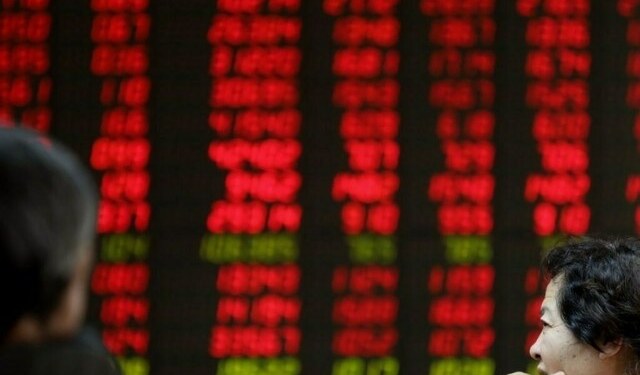NEW YORK: Wall Street stocks retreated from record levels Monday, while Japan’s Nikkei rose for the 15th straight session as markets cheered the weekend election victory of Japan’s pro-business prime minister.
Most European bourses rose modestly, although Madrid took another hit due to the political strife in Spain over Catalonia.
The Dow’s streak of five straight records ended as US stocks pulled back ahead of a deluge of major earnings reports from General Motors, McDonald’s, Amazon and others. Investors are skeptical that earnings will justify soaring stock values, said Art Hogan, chief market strategist at Wunderlich Securities.
“We’ve got things that are priced to perfection,” Hogan said. “We have to figure out which companies have gotten ahead of themselves.”
In Japan, meanwhile, the Nikkei 225 index rose 1.1 percent to end the day at 21,696.65, its 15th consecutive rise and the longest since it came into existence in 1950.
The gains were driven by hopes that Shinzo Abe’s growth blitz — a mixture of huge monetary easing, government spending and reforms to the economy — would continue.
“It’s symbolic” that the record winning streak came a day after Abe won the vote, Hikaru Sato, senior technical analyst at Daiwa Securities, told AFP.
Abe — who came into power in late 2012 on a ticket to reignite the lumbering economy — is now on course to become the country’s longest-serving premier.
“It’s a relief for foreign investors who had bought Japanese stocks aggressively before the election on a bet that Abenomics will continue,” said Masayuki Kubota, chief strategist at Rakuten Securities, referring to Abe’s flagship economic policy.
The growth blitz has been credited with weakening the yen and stoking the stock market although its impact on the broader economy is less clear.
– Catalan clouds –
In Europe on Monday, stock markets pushed higher with the exception of Madrid, which fell 0.6 percent.
Madrid stood firm on its plans to replace the government of the semi-autonomous region whose people voted “Yes” in a banned independence referendum on October 1.
Catalonia’s separatist parties, in turn, called a special session of the regional parliament for Thursday to devise a response.
The euro dropped against the dollar as analysts pondered how the uncertainty in Spain would affect monetary policy. The European Central Bank is widely expected on Thursday to pare back stimulus measures in a long-telegraphed plan.
“The darkening political clouds over Spain argue for any changes in central bank stimulus to be subtle, such as extending its bond buying program that’s due to expire in December for another six to nine months, though at a lower price tag of around EUR40 billion per month from the EUR60 billion it is currently spending,” said Joe Manimbo, senior market analyst at Western Union Business Solutions.
Source: Brecorder.com


























